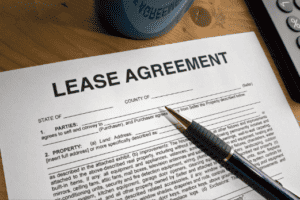If you have recently been handed a notice of non-renewal, there is a lot to know about them. These documents are handed over by landlords to their tenants. They advise the tenant that the lease will not be renewed.
Moving into a new place is one of the most exciting times in life. It can quickly turn sour if you are renting and don’t fully understand what to expect and fail to meet certain obligations.
If you are the renter, it’s important to know what happens when your landlord informs you that they are not going to renew your lease. This can be an unsettling experience since it means having to find another place and budget for moving expenses.
As a renter, you should become familiar with these laws so that you may protect yourself against potential unlawful conduct by the landlord.
That said, there are certain legalities tenants should familiarize themselves with in order to ensure their rights and interests are protected if a non-renewal of a lease does happen.
The Definition of a Non-renewal of Lease
As a tenant, the end of your lease can bring about several changes, one of which is the possibility of a notice of non-renewal from your landlord.
This means that your lease will not be extended once it expires, and you will be required to vacate the premises by a specific date. This can be a difficult situation to deal with, especially if you were not expecting it or are unsure of your next move.
Understanding what a non-renewal of lease means can help you prepare for the next steps, such as searching for a new home or negotiating with your landlord for a possible extension of your lease.
Tenants’ Rights
It’s important to know your rights when it comes to a non-renewal of a lease as a tenant. A landlord is required to give a certain amount of notice before the end of your lease, typically between 30-60 days. This notice of non-renewal allows you to plan accordingly and potentially find a new living situation.
That’s why it’s important to understand the reasons behind the non-renewal and ensure they are not discriminatory or in violation of any lease agreements.
House Bill 1417
House Bill 1417 otherwise known as ‘Residential Tenancies’ is a new proposal in Florida that could override local regulations for tenant-landlord relationships.
This local tenant law covers various aspects of the landlord-tenant relationship. These include the screening process for approving:
- Tenancies
- Security deposits
- Rental agreement terms
- Associated fees
- Eviction notice requirements
When a Landlord Must Notify a Tenant
As a tenant, you need to understand the timeline for when your landlord must notify you of a notice of non-renewal of the lease.
You may be left in a tight spot with little time to find a new place to live. In Florida, per Florida Statute 83.57, if the lease is a year to year lease, the landlord must give the tenant at least 60 days’ notice. If the tenancy is a month to month agreement, the landlord must give the tenant at least 15 days’ notice prior to the end of any monthly period
The notice gives you:
- Time to make arrangements
- Plan to Move out
- Secure a new residence
It’s essential to be aware of your lease agreement terms and the laws in your state to ensure you receive this notice on time.
Keep a Record of Communication With the Landlord
Keeping records of communication with your landlord during the notice of non-renewal process is important when renting a property. It can help you stay organized and ensure that you have all the necessary information at your fingertips.
One particularly important piece of information to keep track of is the notice itself.
This document can have significant consequences for your tenancy, so it’s important to keep it in a safe place.
Stay on top of your communication with your landlord and keeping meticulous records. This way you can help ensure that your renting experience is as stress-free as possible.
Be Aware of Any Fees Attached to a Non-renewal
Before signing a lease agreement, it’s important to take note of the termination clause, particularly the notice of non-renewal.
This clause specifies how many days notice must be given before the end of the lease. This occurs when a landlord is on longer interested in renewing.
Provide adequate notice to avoid being subject to fees or penalties. Be aware of any associated costs that may come with a non-renewal, such as:
- Cleaning fees
- Damage fees
- Pet fees
- Other additional charges
It’s always best to be informed and to plan ahead. This avoids any unexpected costs when it comes time to move out.
Dot Your I’s and Cross Your T’s
When faced with a notice of non-renewal, it’s important to know your rights. Your landlord must notify you of a non-renewal and ensure that all communication between them and yourself is recorded. By being informed and prepared, this will help make this process smoother for everyone involved.
No matter what steps you take towards understanding the rights of the non-renewal, make sure they protect your best interests.
If you have recently been given a non-renewal notice, don’t hesitate. Contact the trusted Melbourne attorneys at Lacey Lyons Rezanka for a consultation today

